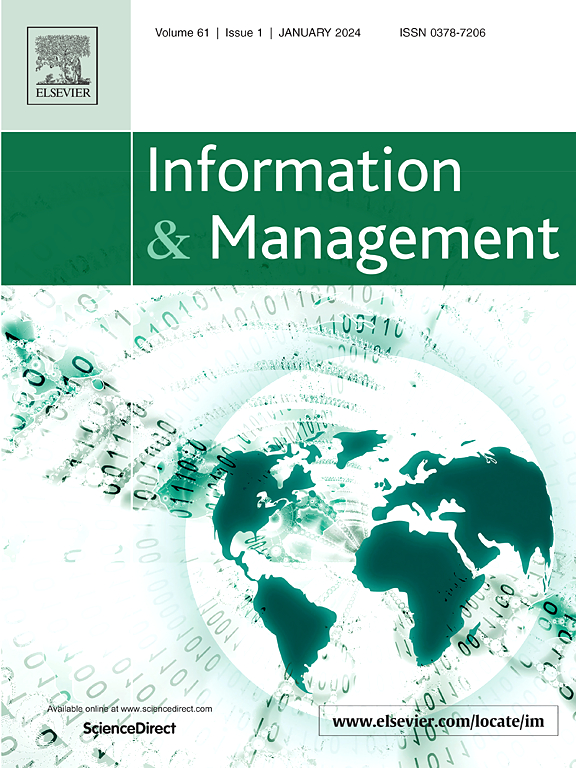Dynamic effects of emotions in microblogs on sharing during EID outbreaks: The contingent role of user personality traits
IF 8.2
2区 管理学
Q1 COMPUTER SCIENCE, INFORMATION SYSTEMS
引用次数: 0
Abstract
Our study empirically examines whether users’ personality traits accentuate or attenuate the influence of emotions in microblogs on users’ sharing behavior over time on a social media platform (Weibo in particular) during emerging infectious disease (EID) outbreaks. We develop a theoretical framework to analyze the dynamic relationship between emotions in microblogs related to EID on users’ sharing with personality traits as moderators. We collected 92,621 microblogs on COVID-19 from Sina Weibo with 501,930 sharing users for hypothesis testing. We leveraged a machine learning method in combination with the vector autoregression model to test our research model. Our results indicate that users with high levels of neuroticism, openness, and agreeableness are more likely to share immediately upon seeing microblogs with negative emotions, while those high in conscientiousness usually share after some time. This study highlights the contingent role of personality traits in the relationship between emotions expressed in microblogs and users’ act of sharing. The dynamic effects (both short-term and long-term) on sharing of emotions in microblogs are contingent upon personality traits. The results help us to understand who shares microblogs, how and why they behave when facing emotional content during EID outbreaks. Our findings enhance the understanding of user behavior on social media platforms and provide actionable insights for potential interventions in response to EID outbreaks.
EID爆发期间微博中的情绪对分享的动态影响:用户个性特征的偶然作用
我们的研究实证检验了在新发传染病(EID)爆发期间,用户的人格特质是否会随着时间的推移而增强或减弱微博中的情绪对用户在社交媒体平台(尤其是微博)上分享行为的影响。我们建立了一个理论框架,以人格特质为调节因子,分析与 EID 相关的微博中的情绪对用户分享行为的动态关系。我们从新浪微博中收集了 92,621 条关于 COVID-19 的微博,共有 501,930 位分享用户参与假设检验。我们利用机器学习方法结合向量自回归模型来检验我们的研究模型。结果表明,神经质、开放性和宜人性较高的用户在看到带有负面情绪的微博时更倾向于立即分享,而自觉性较高的用户通常会在一段时间后再分享。本研究强调了人格特质在微博所表达的情绪与用户分享行为之间关系中的偶然作用。人格特质对微博情绪分享的动态影响(包括短期和长期影响)取决于人格特质。研究结果有助于我们了解在 EID 爆发期间,谁在分享微博,他们在面对情绪内容时的行为方式和原因。我们的研究结果加深了人们对社交媒体平台上用户行为的理解,并为应对 EID 爆发的潜在干预措施提供了可操作的见解。
本文章由计算机程序翻译,如有差异,请以英文原文为准。
求助全文
约1分钟内获得全文
求助全文
来源期刊

Information & Management
工程技术-计算机:信息系统
CiteScore
17.90
自引率
6.10%
发文量
123
审稿时长
1 months
期刊介绍:
Information & Management is a publication that caters to researchers in the field of information systems as well as managers, professionals, administrators, and senior executives involved in designing, implementing, and managing Information Systems Applications.
 求助内容:
求助内容: 应助结果提醒方式:
应助结果提醒方式:


